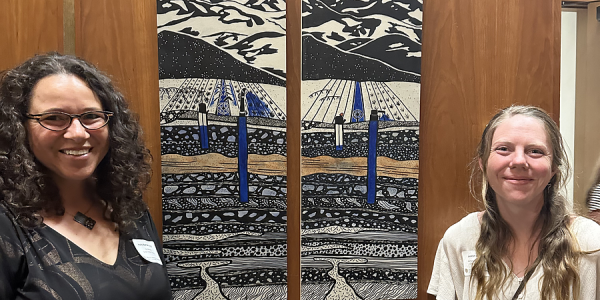In the premier video article of the American Geophysical Union’s journal Perspectives of Earth and Space Scientists, University of Nevada, Reno Professor Emeritus Scott Tyler and marketing and communications director Jennifer Kent lead a “deep dive” into the responsibilities of earth scientists and engineers to lead and diversify the field of hydrology. What was supposed to be a casual “meet and greet” between fellows of the American Geophysical Union’s (AGU) Hydrology Section meeting in June 2022 quickly became much more. Due to ongoing challenges caused by the COVID-19 pandemic, the session was hosted online and recorded.
Tyler, the former president of the AGU’s Hydrology Section, moderated the conversation. As the conversations continued and deepened, Tyler began to recognize that they highlighted some of the pressing issues that the field and the broader scientific community face.
“It’s quite obvious and will be obvious to all those who watch this that our AGU Fellows are deep thinkers and are thinking about current issues,” Tyler said. “I think there is an evolution coming along, and I’m very proud to see that coming from…our AGU Fellows.”
The AGU is the world’s largest professional organization dedicated to earth and space science. AGU Fellowship recognizes outstanding contributions to science and constitutes only 0.1% of the Union’s membership each year.
The conversation included AGU Hydrology Fellows Suzanne Anderson (University of Colorado, Boulder), Paul Brooks (University of Utah), Aaron Packman (Northwestern University), Remko Uijlenhoet (Delft University of Technology), Andrew Western (University of Melbourne) and Xubin Zeng (University of Arizona).
Zeng spoke about the importance of innovation in research and added that scientists should share their failed ideas.
“There is no such thing as a failure, but just ideas you have tried that never worked,” Zeng said. “If we are open, if we take the lead in sharing our unsuccessful stories, that will help accelerate the science.”
The fellows spoke about issues facing the field such as the lack of socioeconomic diversity, the gains made in gender representation, the intersection between research that is impactful and interesting, and recognizing success outside of metrics like citations or academic legacy.
The video, slightly edited for time by Kent, is about one hour long. In that hour, researchers discuss the philosophies of their research and the importance of community, along with other themes. The full video is available to watch on the journal website as an open access publication.




